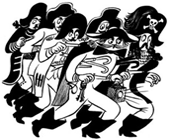Part of Speech: Adjective
Meaning: Illegally produced and sold, as bootleg liquor or bootleg videos.
Notes: In the era of a world economy, it is difficult for a company to control the production and sale of its products in other countries. The problem becomes especially acute if the product may be copied as easily as videos and computer programs. The problem of bootleg digital products is a pressing issue for some companies today, raising our curiosity as to where this odd little word came from. It may be used as a verb unchanged, to bootleg (videos) and those who bootleg are bootleggers.
In Play: In the US, this word was rescued from obscurity during Prohibition, when alcoholic beverages were outlawed and legal liquor was unobtainable. The word is still most closely associated with bootleg liquor: "When I returned from Scotland, I tried to wean my father from his old bootleg hooch to single malt Scotch, but he was too set in his ways." Today, however, the meaning is spreading into other areas of misappropriation: "Why do I think this is a bootleg video, you ask? Well, the first clue is the fact that the sound track has been dubbed in Chinese."
Word History:  The leg of a boot—or bootleg—is that part of a tall boot above the instep. Today's sense of bootleg came from the era of swashbuckling boots that rose to the thighs, the tops of which could be folded down. Rolled all the way up they provided a neat compartment for concealing small items, such as jewelry, while passing through customs. So the word first emerged as a verb meaning to smuggle in a bootleg (or two). The meaning eventually dissolved into smuggling anything anyway and, when men began wearing tighter boots, to what it means today.
The leg of a boot—or bootleg—is that part of a tall boot above the instep. Today's sense of bootleg came from the era of swashbuckling boots that rose to the thighs, the tops of which could be folded down. Rolled all the way up they provided a neat compartment for concealing small items, such as jewelry, while passing through customs. So the word first emerged as a verb meaning to smuggle in a bootleg (or two). The meaning eventually dissolved into smuggling anything anyway and, when men began wearing tighter boots, to what it means today.
No comments:
Post a Comment